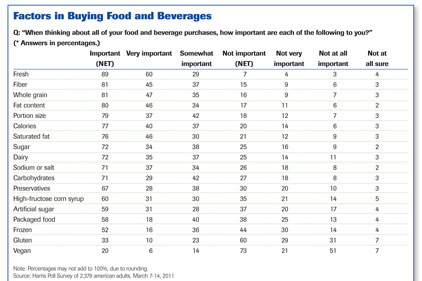According to the results, as Americans age, they develop stronger purchasing preferences and habits with regard to healthier choices. Matures (66+ years old) are the most likely of all generations to pay close attention to nutritional facts and translate their health consciousness into behavior, perhaps because they are more likely to need to follow a diet with specific restrictions, such as with low salt and sugar. As the Harris Poll indicates, “The differences in eating habits among age groups suggest that actual behavioral change may, to some extent, be more driven by necessity than by knowledge.”
Some 89% of all U.S. adults place importance on freshness, when making food and beverage choices. This is followed by fiber (81%), whole grains (81%), fat content (80%), portion size (79%), calories (77%) and saturated fat (76%).
At least seven out of 10 of all U.S. adults placed importance on consumption of protein (83%), fat (81%), whole grains (81%), calories (80%), saturated fat (79%), sugar (76%), cholesterol (75%), carbohydrates (74%) and sodium (73%), when thinking of how they managed their diet and/or weight. Hydrogenated oils were rated the lowest in importance, at 67%.
Sugar and salt drive dietary behavioral change. Over half of U.S. adults (57%) placed some type of monitor or restriction on their diet. Sugar and salt were the top two restricted items, with 34 and 32% restricting salt and sugar, respectively.
According to Harris, nutrition awareness is not translating into dietary change for most generations. Among those who rate sugar or salt as important when managing their diet/weight, less than half of these U.S. adults actually restrict their sugar (42%) or salt (47%) intake. The action/awareness gap is even more pronounced when comparing the youngest and oldest generations, where 32 and 31% of Echo Boomers restrict their sugar or salt intake (respectively). In comparison, 67 and 61% (respectively) of Matures do. pf
